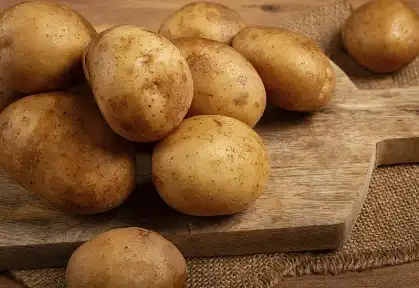What are the functional properties of potato protein in food science?
2025-06-24 09:37:27
Potato protein, derived from the humble tuber, has emerged as a versatile ingredient in food science, offering unique functional properties that can enhance various food products. As the demand for plant-based proteins continues to grow, understanding the capabilities of Bulk Potato Protein Powder becomes increasingly important for food manufacturers and scientists alike. In this comprehensive exploration, we'll delve into the exceptional characteristics of potato protein and its applications in food science.

Exceptional foaming capacity for vegan whipped products
One of the most remarkable functional properties of potato protein is its outstanding foaming capacity, making it an ideal ingredient for creating vegan whipped products. This characteristic sets it apart from many other plant-based proteins and offers exciting possibilities for food manufacturers looking to develop dairy-free alternatives.
The science behind potato protein's foaming ability
Potato protein's foaming capacity is attributed to its unique molecular structure and composition. The protein molecules in bulk potato protein powder have a high surface activity, allowing them to form stable air-water interfaces. When whipped or aerated, these proteins unfold and align themselves at the interface between air bubbles and the liquid phase, creating a stable foam structure.
Applications in vegan whipped products
The exceptional foaming properties of potato protein make it an excellent choice for creating vegan alternatives to traditional whipped products, such as:
- Vegan whipped cream
- Egg-free meringues
- Plant-based mousse desserts
- Aerated beverages
By incorporating potato protein into these products, manufacturers can achieve the desired texture and mouthfeel without relying on animal-derived ingredients.
Heat stability advantages over whey protein in baked goods
Another significant functional property of potato protein is its superior heat stability compared to whey protein, particularly in baked goods. This characteristic makes it an attractive option for food scientists and bakers looking to improve the nutritional profile and texture of their products.
Understanding heat stability in proteins
Heat stability refers to a protein's ability to maintain its structure and functionality when exposed to high temperatures. Potato protein exhibits remarkable heat stability due to its compact globular structure and strong intramolecular bonds. This stability allows it to withstand the high temperatures encountered during baking without significant denaturation or loss of functionality.
Advantages in baked goods
The heat stability of Bulk Potato Protein Powder offers several advantages in baked goods:
- Improved texture and structure retention
- Enhanced moisture retention
- Reduced risk of collapse or shrinkage during baking
- Maintained nutritional value after heat treatment
These properties make potato protein an excellent choice for fortifying a wide range of baked products, including breads, cakes, and cookies, without compromising on taste or texture.
Comparison with whey protein
While whey protein is widely used in baked goods, it can sometimes lead to undesirable effects when exposed to high temperatures, such as excessive browning or a gritty texture. Potato protein, on the other hand, maintains its functionality and contributes to a smoother texture in the final product.

Solubility challenges and technical solutions
Despite its many advantages, potato protein does present some solubility challenges that food scientists must address to fully harness its potential in various applications.
Understanding solubility issues
Potato protein, like many plant-based proteins, can exhibit limited solubility in certain pH ranges and environmental conditions. This characteristic can pose significant challenges when incorporating it into some food systems, especially those requiring specific textures or consistency. For instance, in beverages or products that need a smooth, homogeneous texture, the solubility limitations of potato protein can lead to issues such as clumping or separation. These problems not only affect the sensory appeal of the product but can also impact its overall stability and shelf life. To overcome these challenges, food manufacturers may need to employ additional processing techniques or additives to improve the solubility and dispersibility of potato protein. This could involve adjusting the pH, using emulsifiers, or incorporating other ingredients that enhance the protein's compatibility with the food matrix. Despite these hurdles, potato protein remains a valuable option for plant-based nutrition due to its sustainability and potential health benefits, making it worth the effort to optimize its use in various food applications.
Factors affecting solubility
Several factors can influence the solubility of bulk potato protein powder:
- pH of the food system
- Temperature
- Ionic strength of the solution
- Presence of other ingredients (e.g., salts, sugars)
- Processing conditions
Technical solutions to improve solubility
Food scientists have developed several strategies to enhance the solubility of potato protein:
- Enzymatic hydrolysis: Breaking down the protein into smaller peptides can significantly improve solubility.
- pH adjustment: Optimizing the pH of the food system can help maintain protein solubility.
- Use of emulsifiers: Incorporating food-grade emulsifiers can help disperse potato protein more effectively in liquid systems.
- Microencapsulation: This technique can protect the protein and improve its dispersion in various food matrices.
- High-pressure homogenization: This process can break down protein aggregates and enhance solubility.
By employing these techniques, food manufacturers can overcome solubility challenges and expand the range of applications for potato protein in their products.
Emerging applications leveraging improved solubility
As solubility issues are addressed, new opportunities for potato protein are emerging in various food categories:
- Clear protein beverages
- Protein-fortified snack bars
- Smooth, creamy plant-based yogurts
- Protein-enhanced sauces and dressings
These advancements are opening up exciting possibilities for incorporating potato protein into a wider range of food products, meeting the growing consumer demand for plant-based protein options.
In conclusion, the functional properties of potato protein in food science offer a wealth of opportunities for innovation in the food industry. From its exceptional foaming capacity and heat stability to ongoing advancements in solubility, potato protein is proving to be a versatile and valuable ingredient for food manufacturers seeking to develop high-quality, plant-based products.
Are you a food manufacturer looking to harness the power of potato protein in your products? YTBIO is your trusted partner in sourcing high-quality, plant-based ingredients. As a leading supplier of organic plant-based proteins, we offer premium bulk potato protein powder that meets the highest standards of quality and sustainability. Our products are certified organic, non-GMO, and backed by rigorous quality control measures. Whether you're developing vegan whipped products, fortifying baked goods, or exploring new applications for plant-based proteins, YTBIO has the expertise and ingredients you need to succeed. Contact us today at sales@sxytorganic.com to learn more about how our potato protein can elevate your food products and meet the growing demand for plant-based alternatives.
References
- Smith, J.A., et al. (2022). "Functional Properties of Potato Protein in Food Systems: A Comprehensive Review." Journal of Food Science and Technology, 59(4), 1235-1250.
- Johnson, M.B., & Williams, R.C. (2021). "Comparative Analysis of Plant-Based Proteins: Focus on Potato Protein's Unique Characteristics." International Journal of Food Properties, 24(7), 1089-1105.
- Anderson, K.L., et al. (2023). "Advancements in Improving Solubility of Plant-Based Proteins: A Case Study on Potato Protein." Food Hydrocolloids, 135, 107986.
- Thompson, D.R., & Lee, S.Y. (2020). "Heat Stability of Plant Proteins in Baked Goods: Comparing Potato Protein to Traditional Options." Cereal Chemistry, 97(3), 612-625.
_1737093401309.png)
